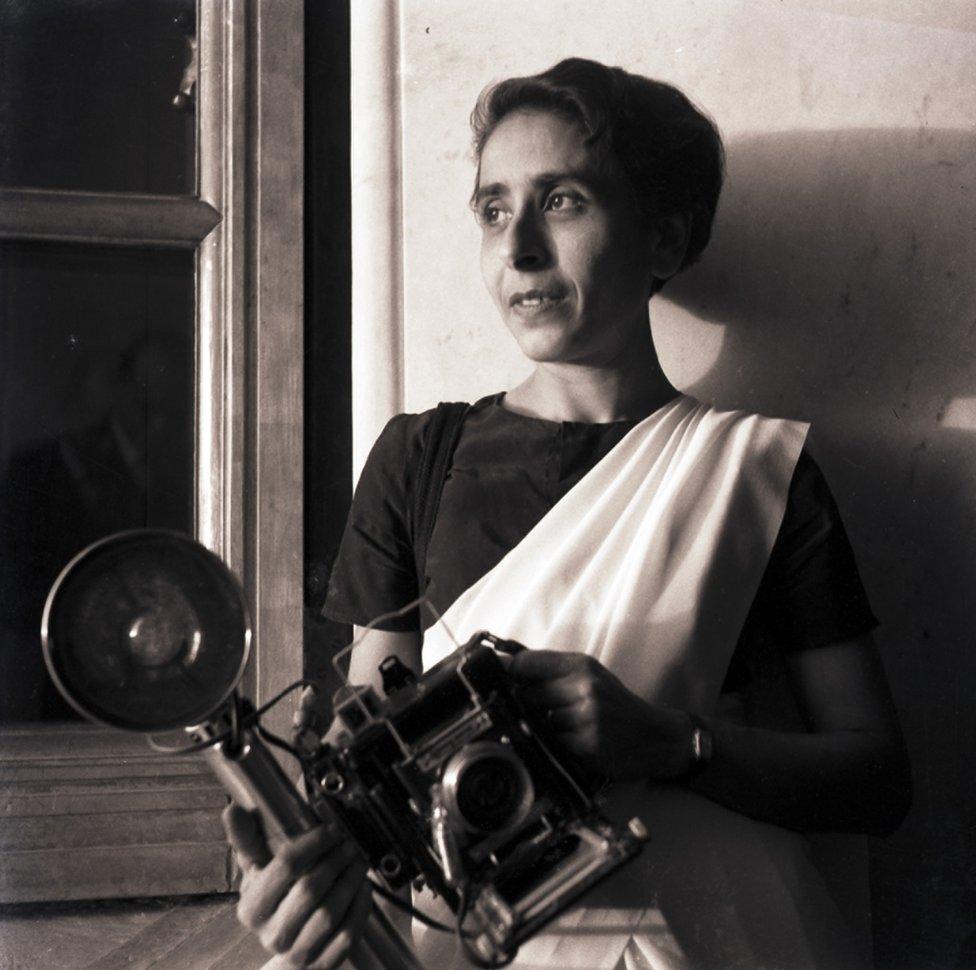Homai Vyarawalla: The trailblazer who became India's first woman photojournalist
- Published

Ms Vyarawalla with her constant companion, the speed graphic camera
Homai Vyarawalla, India's first woman photojournalist, is best known for documenting the country's transition from a British colony to a newly independent nation. The 大象传媒 chronicles her life and career through a rare collection of her work.
Ms Vyarawalla was born on 9 December 1913 in the western Indian state of Gujarat. Her family belonged to India's tiny but influential Parsi community.
She spent much of her childhood on the move because her father was an actor in a travelling theatre group. But the family soon moved to Mumbai (then Bombay), where she attended the JJ School of Art.
She was in college when she met Manekshaw Vyarawalla, a freelance photographer, who she would later marry. It was he who introduced her to photography.
Ms Vyarawalla's earliest photos were taken during her college days
She received her first assignment - to photograph a picnic - while she was still in college. It was published by a local newspaper, and soon she started to pick up more freelance assignments.
She began to draw more attention after her photographs of life in Mumbai were published in The Illustrated Weekly of India magazine.
Her earlier work included photographing people from all walks of life
The Vyarawallas moved to Delhi in 1942 after they were hired to work as photographers for the British Information Service.
Ms Vyarawalla, one of few female photojournalists working at the time in Delhi, was often seen cycling through the capital with her camera strapped to her back.
A fox hunt in Delhi in the 1940s
She took her most iconic images, however, after India became independent - from the departure of the British from India, to the funerals of Mahatma Gandhi and former prime minister Jawaharlal Nehru.
Lord Mountbatten travels from the viceroy's home to the parliament on 15 August 1947
India celebrates its first Republic Day on 26 January 1950 in Delhi
Ms Vyarawalla also photographed most prominent independence leaders.
But she said that her biggest regret was that she missed photographing the meeting where Mahatma Gandhi was assassinated. She was on her way to attend it when her husband called her back for some other work.
Mahatma Gandhi (left) and independence leader Khan Abdul Ghafar Khan (right) arrive at a meeting where it was decided to partition the country
Her work also includes candid, close-up photographs of celebrities and dignitaries who visited India in the years following independence, including China's first prime minister Zhou Enlai, Vietnamese leader Ho Chi Minh, Queen Elizabeth II and US President John F Kennedy.
Queen Elizabeth at a fashion show in Delhi in 1961
Ms Vyarawalla photographed many famous people but Mr Nehru figures most prominently in her work as her "favourite subject".
Mr Nehru lights a cigarette for the wife of a British diplomat
She said in an interview that when Mr Nehru died she "cried, hiding my face from other photographers".
Mr Nehru with his sister Vijayalaxmi Pandit
Ms Vyarawalla clicked her last picture in 1970, retiring after a four-decade-long career. She left Delhi after her husband died in 1969 and moved to Gujarat.
She was awarded India's second highest civilian honour, the Padma Vibhushan, in 2011. She died on 16 January 2012 at the age of 92.
Photos: HV Archive/ The Alkazi Collection of Photography
Homai Vyarawalla's photography is part of the permanent collection of The Alkazi Foundation for the Arts based in Delhi.